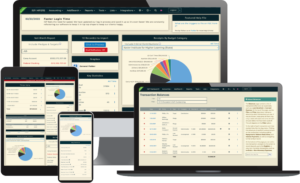
In today’s digital age, the security of political software systems is crucial to safeguarding democratic processes and protecting sensitive information from cyber threats. Let’s explore why political software security is so important. We’ll cover key components, regulatory frameworks, risks of inadequate security, innovations in monitoring systems, and future directions.
Introduction to Political Software Security
Political software security involves the implementation of measures and protocols to protect political data and infrastructure from unauthorized access, manipulation, and disruption. It encompasses technologies and strategies aimed at ensuring the integrity, confidentiality, and availability of sensitive information critical to electoral processes.
As political campaigns and electoral processes increasingly rely on digital platforms, the evolution of political software security has become intertwined with advancements in technology and the growing sophistication of cyber threats. The stakes are higher than ever, with political entities facing significant risks from malicious actors seeking to exploit vulnerabilities in digital systems.
Key Components of Political Software Security
Ensuring the integrity and confidentiality of political data is essential to prevent unauthorized access and manipulation. Encryption techniques, such as AES (Advanced Encryption Standard), and secure communication channels, such as VPNs (Virtual Private Networks), are critical in protecting sensitive information such as voter data, campaign strategies, and communication channels from interception and tampering.
Access control mechanisms restrict who can access political software systems and what actions they can perform. Robust authentication methods, including multi-factor authentication (MFA) and biometric authentication, can verify the identity of users. Authorization protocols define permissions and privileges, ensuring that only authorized personnel can access and modify critical political infrastructure.
Regulatory Frameworks
The National Conference of State Legislatures has recognized the importance of ongoing cybersecurity in rule-making and legislation, which will undoubtedly affect the types and sources of software that are allowed to be used in government and electoral processes. They have already passed bills and resolutions that “Mandate security practices related to elections,” highlighting the importance of software security as the gatekeepers of sensitive voter data.
Examples of Security Breaches
A data security breach in campaign software poses a significant risk of exposing sensitive information, including voter data, donor details, and campaign strategies. These breaches can occur through various attack methods, including:
- Phishing attacks: Social engineering tactics used to deceive individuals, such as campaign workers, into divulging confidential information, like login credentials, enabling unauthorized access to campaign data.
- SQL injection: Exploiting vulnerabilities in web applications to manipulate database queries, potentially leading to data exfiltration, modification, or deletion.
- Malware infections: Introducing malicious software into the campaign’s environment through various methods, such as phishing emails or infected software, to steal or compromise data.
- Insecure data handling: Improper storage, transmission, or disposal of sensitive data, increasing the risk of unauthorized access and data breaches.
The consequences of a campaign software breach can be severe, including:
- Voter disenfranchisement: Misuse of voter data for targeted disinformation or suppression tactics.
- Financial loss: Theft of donor information for fraudulent purposes or identity theft.
- Competitive advantage: Exposure of campaign strategies to opposing campaigns.
- Reputational damage: Loss of public trust due to a breach of confidence.
Risks and Consequences of Inadequate Security
Recent elections have witnessed notable breaches in political software security, highlighting vulnerabilities and the potential consequences of inadequate security measures. Incidents of data breaches, unauthorized access to voter databases, and manipulation of election results underscore the critical need for robust cyber security in political campaigns and electoral processes. Here are two brief examples:
Democratic Party
- Incident: DNC Email Hack (2016)
- Description: During the 2016 United States presidential election, the Democratic National Committee (DNC) experienced a significant cyberattack. Hackers, suspected to have ties to Russian intelligence agencies according to investigations, gained unauthorized access to the DNC’s email servers and networks.
- Impact: Sensitive emails and documents were stolen and subsequently leaked to the public via various online platforms. The leaked information included internal communications, campaign strategies, and discussions about candidates. This breach led to media scrutiny, public controversy, and debates about foreign interference in the election.
- Response: The incident prompted extensive investigations by cybersecurity firms and U.S. government agencies. It also sparked discussions about the cybersecurity measures of political organizations and efforts to strengthen defenses against future cyber threats.
Republican Party
- Incident: NRCC Email Hack (2018)
- Description: In 2018, the National Republican Congressional Committee (NRCC), which supports Republican House candidates, reported a cyberattack involving unauthorized access to email accounts used by senior aides.
- Impact: The breach exposed sensitive communications, campaign strategies, and donor information. The stolen data included emails discussing campaign tactics and internal party affairs. While the full extent of the breach and the perpetrators’ identity were not publicly disclosed, it raised concerns about the security of Republican campaign operations.
- Response: The NRCC worked with cybersecurity experts and law enforcement agencies to investigate the incident and enhance cybersecurity measures. The incident underscored the vulnerability of political campaigns to cyber threats and highlighted the ongoing need for robust defenses and vigilance in protecting electoral processes.
Public Perception and Trust Issues
Inadequate security can erode public trust in electoral processes and undermine voter confidence in candidates. But worse, it can cause a loss of political capital that campaigns can’t afford. Security breaches can alert political opponents to a campaign’s strategies and plans. A significant breach could even result in one’s primary competitor gaining access to their donor list. Media coverage of security breaches and vulnerabilities can amplify concerns about the safety of donor information. Campaigns, particularly campaign finances, need to be free from cyber threats and security breaches if candidates wish to retain the confidence of their donors and voters.
Innovations in Monitoring Systems
Advanced threat detection technologies, including AI (Artificial Intelligence) and machine learning applications, enhance the detection and mitigation of cyber threats in real time. These technologies analyze patterns, detect anomalies, and respond swiftly to potential security incidents, bolstering the resilience of political software systems against evolving cyber threats.
Political Software Security is Extremely Important
Political software security is indispensable in protecting sensitive information, and thereby upholding public trust in the entities who have access to that information. Campaigns that use sub-standard technology to house voter information put their supporters and their own campaigns at risk. By prioritizing data integrity, confidentiality, and compliance with regulatory frameworks, political entities can mitigate risks, enhance transparency, and retain the trust of their voters.
As technology continues to evolve, ongoing innovation in monitoring systems and cybersecurity practices will be essential to adapting to emerging threats and securing the future of digital democracy. To learn more about the robust security features of ISPolitical’s campaign accounting software, contact ISPolitical today!






